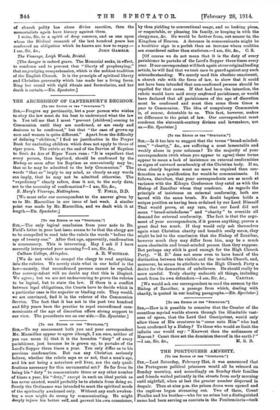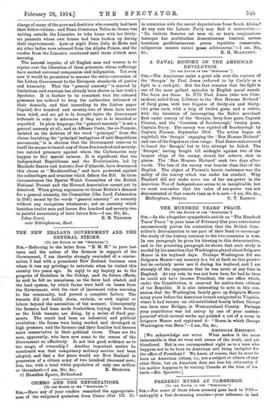THE PORTUGUESE AMNESTY.
[To not Zones or rag •'Srseraros'•1
Sin,—Last Saturday, February filet, it was announced that the Portuguese political prisoners would all be released on Sunday morning, and accordingly on Sunday their families and friends waited patiently in the streets from early morning until nightfall, when at last the greater number dispersed in despair. Then at nine p.m. the prison doors were opened and the captives began streaming out. Two of them, Count Ficalho and his brother—who for no crime but a distinguished name had been serving as convicts in the Penitenciaria—took charge of many of the poor and destitute who recently had been their fellow-victims: and Dona Constanea Telles da Gama was waiting outside the Limoeiro to take home with her thirty- six peasants whose own homes had been broken up during their imprisonment. Late at night Dona Julia de Brits and six other ladies were released from the Ababa Prison, and the exodus from the Limoeiro continued until three o'clock next morning.
The natural impulse of all English men and women is to rejoice over the liberation of these prisoners, whose sufferings have excited universal compassion and indignation. Yet even now it would be premature to assume the entire conversion of the Lisbon Government to the European standards of justice and humanity. That the '•general amnesty" is marred by limitations and evasions has already been shown in last week's Spectator. It is further to be remarked that the released prisoners are ordered to keep the authorities informed of their domicile, and that (according to the Lisbon paper Capital) five hundred and seventy-two of them have never been tried, and are yet to be brought before the Government tribunals in order to determine if they are to be banished or acquitted. In plain language, the "general amnesty" is not a general amnesty at all; and as Affonso Costa, the ex-Premier, insisted on the deletion of the word "principal" from the clause banishing the "principal instigators of anti-Republican movements," it is obvious that the Government reserves to itself the means to banish any of these five hundred and seventy- two untried prisoners against whom the Carbonarios may happen to feel special animus. It is significant that the Independent Republicans and the Evolutionists, led by Machado Santos and Antonio Jose d'Almeida, have denounced this clause as "Machiavellian," and have protested against the subterfuges and evasions which deface the Bill. In these circumstances the Special Watch Committee of the British National Protest and the Howard Association cannot yet be dissolved. When giving expression to Great Britain's demand for a general amnesty, the Committee (like Lord Palmerston in 1847) meant by the words " general amnesty" an amnesty without any exceptions whatsoever; not an amnesty which banishes twelve men and leaves five hundred and seventy-two in painful uncertainty of their future fate—I am, Sir,















































 Previous page
Previous page